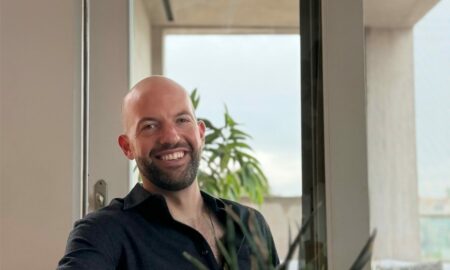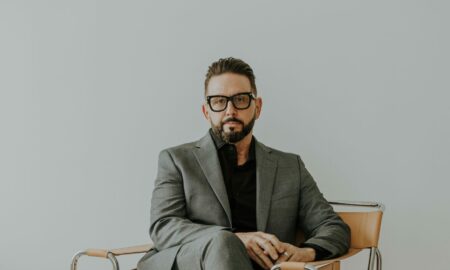
Today we’d like to introduce you to Rishi Thomas.
Thanks for sharing your story with us Rishi. So, let’s start at the beginning and we can move on from there.
I am originally from New Delhi, India and was born to two ferociously ambitious parents. As a child, I was always told to focus on what you love, and do things to the best of your ability, but it’s most important to be a good human being first. So, with those nuggets of wisdom, I had my first experience away from home at an international boarding school called Woodstock School.
My time at Woodstock was a transformative one. The support of my peers along with the insight of my teachers allowed me to hone my talents and ask questions outside of the traditional educational paradigm. I became passionate about solving problems in education and how to make curriculums more geared towards innovation. Therefore, as a senior, I – along with three other students and the head of academics – founded an initiative that allows students to help design courses and programs geared towards personal interests. Given the miniscule number of students, being able to structure time outside of class towards passion projects was fairly easy.
As I entered college as a business student, I had my first interaction with the word ‘startup’ through my entrepreneurship organization – Sigma Eta Pi. SEP brought together a host of creatives from various backgrounds and interests. As I interacted with more individuals and spent time attending various events and conferences around LA, I realized that entrepreneurship is something that I am deeply passionate about, and want to pursue for the rest of my life (not only as a career but even as a lifestyle).
I joined Contrary Capital as a venture partner my freshman year and began learning everything I could about startups. Contrary Capital is a university focused venture fund that aims to back the brightest entrepreneurs in college across the United States. The summer following freshman year, I worked with Microsoft Accelerator in India assisting later stage startups. I conducted research on startup ecosystem growth and helped out with various accelerator activities. With another intern at Microsoft, I co-founded Qdero – an online consulting platform for the Indian job market. Qdero was incubated at NASSCOM in New Delhi but did not survive long as both of us had to quit working on the company due to company growth and personal reasons. I spent the next summer working with Investopad (founded by Asia 30 under 30 2017 members Arjun and Rohan Malhotra) on investment diligence and events – I hosted two events that aimed to teach entrepreneurs about various facets of owning and operating a startup. As a senior, I found a love for blockchain technology and recently joined Block 30 Labs as a business development associate. My role at Block 30 Labs involves fundraising, strategic partnerships and strategy. I graduate USC in May 2020.
Has it been a smooth road?
In hindsight, my journey looks a lot smoother than I remember it. The field of entrepreneurship is filled with passion and desire to succeed and create something meaningful, but it comes with hordes of self-doubt and worry. There are always going to be people that are doing ‘cooler’ things and achieving more in the same time frame (if not quicker). Therefore, having a strong peer network and core set of values is very important in managing the overwhelming amount of information. My biggest challenge was managing Qdero. I was in the United States, while my co-founder was in India. So, the first constraint became managing time zones and efficiently allocating work to suit our strengths. As the pressures of school and other engagements increased, I noticed that both of us started running behind on schedule. This problem, I believe we could have easily addressed with better meeting hours and frequent check-ins. The failure, I believe came when we realized that we had built a platform that we were not able to monetize. We lacked the maturity to think of different ways to generate revenue for the company and thought it best to dedicate time learning and growing our skills before we dove back into starting another company.
Besides Qdero, being around high achievers and a society that is getting more talented and advanced at an incredible rate, I always feared not being able to live up to my own expectations. I frequently speak about this with my friends, and they share the same concerns with their own lives. We are living in very competitive times, and being able to stand out becomes exceedingly difficult. Self-doubt coupled with the challenges of college made my formative years at USC very difficult. I was fortunate to have a great set of friends, and the undying support of my parents that allowed me to think past the issues and focus on solutions step-by-step. Friends, and family, if you’re reading this, you have my undying gratitude.
So let’s switch gears a bit and go into the University of Southern California story. Tell us more about the business.
Block 30 Labs aims to incorporate blockchain technology into people’s lives through its suite of products: payments, financial and marketplace. Like any startup, each individual is expected to play a dynamic role. I tend to focus on getting leads for fundraising, partnership and tech development. We recently received the top blockchain project in North America at the World Blockchain Summit (https://www.prnewswire.com/news-releases/block-30-labs-wins-best-north-america-startup—2019-at-world-blockchain-summit-300895893.html)
We have been incredibly scrappy with the way we conduct our business. Our CEO Brian Foote heavily emphasizes a lean mindset in running the company, and we have been incredibly fortunate with the relationships each of us have built along the way. I think what truly sets us apart, is our emphasis on building first and marketing later. A lot of projects in this industry raise exorbitant amounts of money on an idea only to realize that their initial vision is too difficult to execute and needs to be changed. Eventually, these companies die out, and a lot of resources are lost in the process. Therefore, we were heavily focused on building products that we could see our customers using, and raise money to further our current vision rather than have funding drive our operations.
How do you think the industry will change over the next decade?
I think blockchain is here to stay. There is a lot of ‘hype’ in the space, and most people are worried about cryptocurrency prices. I think the technology is revolutionary in its various applications – identity, banking in remote places, data integrity and a lot more. The rise of bitcoin in 2017 made the whole world question where their money comes from, and what the financial system is all about. So, the technology has had a wide impact and will continue to do so. Enterprise adoption is key in growing the capability of the technology – IBM Hyperledger, Microsoft and Amazon’s efforts into blockchain as a service and even Facebook with Libra as some preliminary examples. For more fast-paced industries, enterprise blockchain systems accelerate adoption simply because enterprises have the ability to disseminate their products on a large scale, due to the resources they have and the ability to continuously iterate and make their products better. Because of how new the technology is, competition will only further the refinement of product offerings – almost like catching social networks at the beginning of their development. All in all, there is a lot to be excited about.
Contact Info:
- Website: https://www.block30labs.com/
- Email: [email protected]
- Instagram: https://www.instagram.com/block30labs/
- Twitter: https://twitter.com/block30labs?lang=en
- Other: https://www.linkedin.com/company/block-30-labs/




Suggest a story: VoyageLA is built on recommendations from the community; it’s how we uncover hidden gems, so if you or someone you know deserves recognition please let us know here.




















